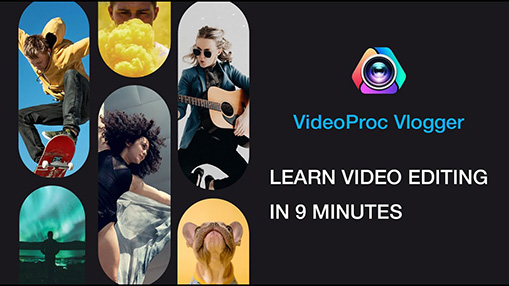Open source video editor is the video editing applications whose original source code can be accessed by masses without having to shell out a single dime. It can also be modified and redistributed for catering to a wide variety of users. And the best part about them is that almost all of them are free of charge.
On the market, there are a vast number of open source video editing software. To help you guys find the best one, in this post, we will cover them all with details. Check them now.
| Software | Platform | Features | License |
|---|---|---|---|
| Avidemux | Linux, Windows, macOS | Simple cutting, filtering, and encoding tasks | GPL |
| Blender | Linux, Windows, macOS | 3D animation, modeling, rendering, compositing, motion tracking, video editing, and more | GPL |
| Cinelerra GG Infinity | Linux | Non-linear video editing, image compositing, image and audio filtering, and more | GPL |
| FFmpeg | Linux, Windows, macOS | Command-line tool for converting, compressing, decompressing, and streaming audio and video | LGPL or GPL |
| Flowblade | Linux | Non-linear video editing, video effects, transitions, animations, and more | GPL |
| Kdenlive | Linux, Windows, macOS | Multi-track video editing, timeline effects, keyframes, audio and video scopes, and more | GPL |
| LiVES | Linux, BSD, macOS | Non-linear video editing, real-time video performance, VJ tools, and more | GPL |
| NATRON | Linux, Windows, macOS | Node-based compositing, visual effects, motion graphics, and more | GPL |
| Olive | Linux, Windows, macOS | Non-linear video editing, video effects, titles, audio tracks, and animations | GPL |
| OpenShot | Linux, Windows, macOS | Non-linear video editing, video effects, transitions, titles, audio tracks, and animations | GPL |
| Pitivi | Linux | Non-linear video editing, video effects, transitions, keyframes, and more | LGPL |
| Shotcut | Linux, Windows, macOS | Non-linear video editing, video effects, filters, color grading, and more | GPL |
| VidCutter | Linux, Windows, macOS | Simple video cutting and joining | GPL |
1. Avidemux
Available on: Windows, macOS, Linux, and BSD (Berkeley Software Distribution).
Official Website: avidemux.sourceforge.net
Imagine a software that can do all the things VirtualDub can do, it can also run on different operating systems, supports a large number of containers and formats, comes with all the codecs you need, and at the same time, avoids an annoying interface like Video For Windows, this is Avidemux.
Avidemux is a free video editor that can perform tasks such as cutting, filtering, and encoding. It supports a wide range of file formats, including MP4, MKV, OGM, AVI, MPEG4, ASF, 3GP, MPG (for input) and M2V, AVI, OGM, FLV, M2V, M1V, TS (for output). Yes, it can even work as an MKV editor.
What really makes it amazing is its filtering features. Avidemux has many built-in video filters. Most of them are ported from MPlayer, VirtualDub, and Avisynth. They include many Deinterlacing and IVTC filters, such as Yadif, TDeint, Kernel Deinterlacer, Smart Deinterlacer, mcDeinterlace, DGBob, and Decomb Telecide. In addition, there are filters for noise reduction, image sharpening, and color correction.
In it, you can also edit the audio track. You can use it to decompose sound from files. Four different audio tracks can be selected along with a video file and each one of them can be configured individually for rendering a professional-grade finish.
When you export the file after you finish editing, it will provide users with total control over the encoding of both audio and video.
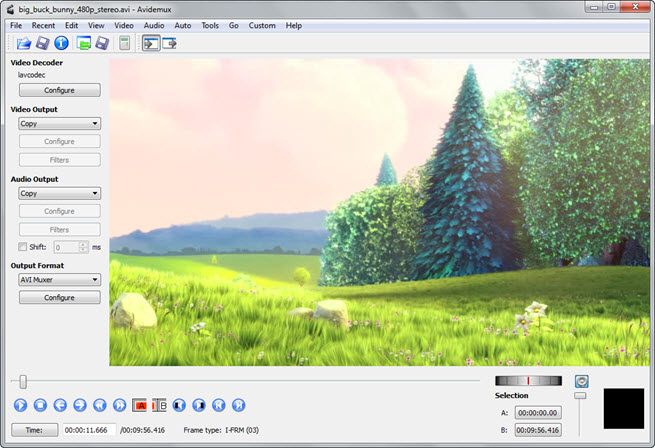
If you want to learn more about Avidemux, you can switch to this full review guide about Avidemux >>
2. Blender
Available on: Windows, macOS, and Linux.
Official Website: https://www.blender.org/
If you are looking for a little more professional open source video editor (but not as professional as Final Cut Pro, Adobe Premiere Pro, etc.), then Blender must be on your list. In reality, Blender is a powerful 3D animation software that provides users with solutions to modeling, rendering, audio processing, video editing, and more. And in this post, we will mainly show you how it works great in video editing.
In Blender, you can do basic editing with your video clips like cutting, trimming, splicing, etc. but also some advanced things. There are 32 tracks supported for adding video, images, audio, scenes, masks and effects. With it, you can customize the video speed, add and adjustment layers, transitions, keyframes, filters and more. Besides, you can also polish the audio file, such as mixing, syncing, scrubbing and waveform visualization.
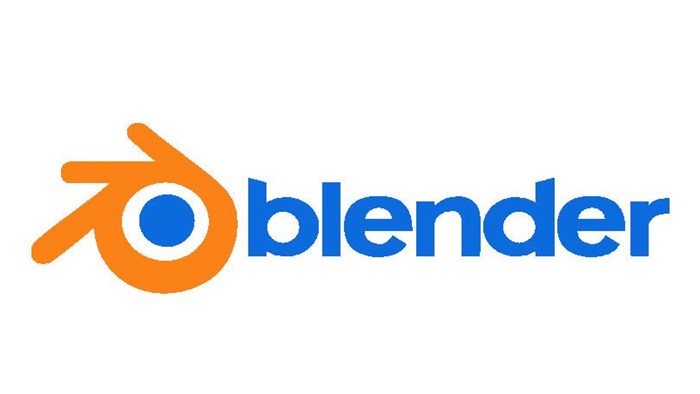
3. Cinelerra GG Infinity
Available on: Linux and BSD.
Official Website: http://cinelerra.org/
This open source video editing software was developed by Adam Williams in June 2000. Its interface is pretty much like some common Non-linear editing tools, with 4 major parts, i.e., timeline, viewer, the resource window, and compositor. With it, people can do much more than video editing, but also rendering, compositing, motion tracking, and much more. It supports 8K video processing. Since it has integrated with FFmpeg, there would be a number of codecs compatible with it.
With it, you can do any basic video editing jobs, like cutting and splicing, but also some more advanced ones, like adding transitions. Surely, compared to the professional commercial applications, like Final Cut Pro and Adobe Premiere Pro, there would be a huge gap that Cinelerra needs to catch up with. Anyway, for common Linux users, I would highly recommend it as your best open source video editor.
4. FFmpeg
Available on: Windows, macOS, and Linux.
Official Website: https://ffmpeg.org/
FFmpeg was developed under Linux, but it can be compiled in most operating systems including Windows. This project was initiated by Fabrice Bellard and is now hosted by Michael Niedermayer. It includes libavcodec, the leading audio/video coding library.
In detail, FFmpeg has these powerful functions of video capture, video and audio format conversion, video screenshot, and watermarking a video. The video capture function of FFmpeg can not only capture images from a video capture card or USB camera, but also perform screen recording. At the same time, it also supports transmitting video streams in RTP way to streaming media servers that support RTSP. For conversion, it can be used to convert digital audio and video, and even convert them into streams. It is able to easily realize the mutual conversion between a variety of video formats (wma, rm, avi, mod, etc.), for example, changing the recorded video .avi, etc. into the .flv format used by the most of the current video website.
5. Flowblade
Available on: Linux.
Official Website: https://jliljebl.github.io/flowblade/
Flowblade is an open source video editing tool with multiple tracks. It can support up to 78 video codecs and 58 audio codecs. Almost all media files which can run in the Linux system can be covered. For the video editing job, you can easily drag and drop any clip in the timeline in the sequence that you want. You can cut and trim the clip, and more such fundamental ones. Also, you can do advanced ones like adding filters, changing text style, and more. You can also work on the audio file in Flowblade. You can split the audio track off the video file, mix the audio, mute it, and add filter to it. And here is the list of its main features that you will love,
- 9 combined video and audio tracks available;
- Clip and Compositor parenting and resync with other clips;
- Make clips slow motion or in fast speed;
- Compositors with affine blend, blend, transform, alpha, wipe, blend, and fades;
- Color grading;
- Split audio from video;
- Audio mixer...
6. Kdenlive
Available on: Windows, macOS, Linux, and BSD.
Official Website: https://kdenlive.org/
To be honest, Kdenlive is not an open source application with an interface friendly to beginners. But it has its unique features which will make you love it. It is free, obviously. It will not cost you a dime. You can just go to the website, download and install it, and you can enjoy its editing functions for polishing your clips. Second one, it supports proxy clips. So there would be no laggy issue when editing 4K videos. Then it has a bunch of video editing features. Kdenlive supports multiple audio and video tracks, multiple transition effects, green screen keying, key frames, and many audio and video effects. Although Kdenlive still cannot meet the requirements of industrial grade, it can basically meet the needs of semi-professional video editing.
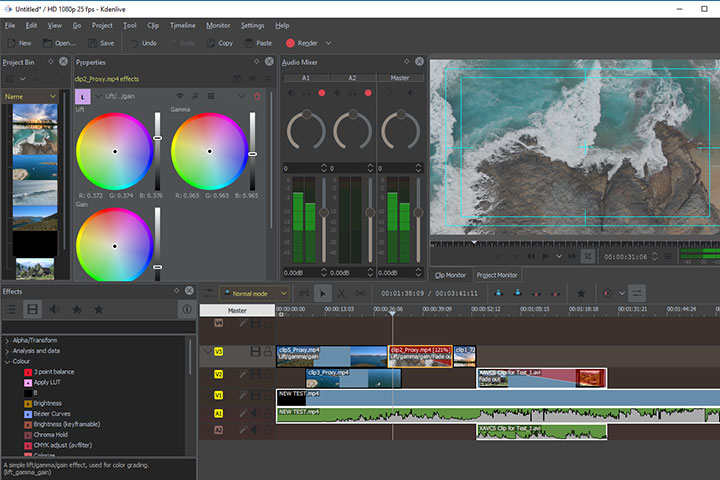
If you want to learn more about Kdenlive, you can switch to this full review guide about Kdenlive >>
7. LiVES
Available on: IRIX, Linux, Solaris, and BSD.
Official Website: https://github.com/salsaman/LiVES
LiVES is an open source video editing tool which you can only on GitHub, for now. It is an easy-to-use but powerful video effects, editing, conversion and playback software. Its design concept is simple to use, but powerful. It allows you to start editing and making videos immediately without worrying about format, frame size or frame rate. It is also a very flexible tool. You can just use keyboard shortcut for editing clips. It uses dozens of real-time effects. There is a multi-track timeline where you can add multiple clips, audio, transition, and more. In it, you can preview the unfinished footage in real time, and then edit it further or export it immediately if it meets your requirements.
8. NATRON
Available on: Windows, macOS, Linux, and BSD.
Official Website: https://natrongithub.github.io/
NATRON is actually an open source composite software for VFX and motion graphics. When we are going to talk about composite software, many of you may first think of Adobe After Effect (also known as AE). Indeed, AE is a very popular, novice-friendly, comprehensive and powerful post-composite software for special effects. But AE is not free software, right? So Natron would become one of your alternative options to AE.
As an outstanding representative of free, open source and cross-platform post-composite software, Natron's performance is not bad at all. It can do many special effects that AE can do, and can also do the operations that can be done in the high-end software Nuke. What NATRON differs from AE is that AE is with a layered operation, while Natron is with a nodal operation. If you come from AE, the first feeling will be that Natron is more difficult to understand.
9. Olive
Available on: Windows, macOS, and Linux.
Official Website: https://www.olivevideoeditor.org/
Olive is a non-linear video editing application currently in alpha. So there would be some bugs and defects. The developers say that they would like to make it a perfect alternative to the high-end professional editors, like Final Cut Pro, Adobe Premiere Pro, etc. Well, we downloaded and tested it for like one hour. For now, honestly, there would be a long journey to go before it performs wonderfully like FCP or others.
However, it is quite competent in some basic video editing jobs. It deserves your trial definitely. This video editing software edits the video clips in overlaying layers way. Although we can't say that it is perfect, it makes users feel very comfortable to experience. Olive has just arrived in version 0.1.0 alpha, and already has most basic video editing functions, basic animation frame adjustment functions, and transition effects. It can add text layers, denoise, etc.
10. OpenShot
Available on: Windows, macOS, BSD, and Linux.
Official Website: https://www.openshot.org/
This powerful video editor comes with tones of features and capabilities making it the ideal pick for both amateurs and professionals. You can operate this versatile open source video editor for Windows, Mac, and Linux systems for imparting a premium finish to all your video files. The cross-platform nature of this free open source video editor helps in saving the video in one OS and opening the same in another.
This open source video editor supports more than 70 different languages which can be translated online using LaunchPad. Its drag and drop functionality helps in resizing, importing and repositioning clips on the multi-track timeline of the program. With it, you can easily impart various editing effects to a video clip by simply right-clicking the same and taking your pick among the different options of Copy, Paste, Animate, Volume, Fade, Time, Slice, etc. Professional-grade features like overlays, transitions, rotoscoping support, title creators, watermarks, keyframe animation, etc. can suffice experienced video editors.
More detailed, it allows the addition of unlimited layers for background videos, watermarks, audio tracks and many more. In it, titles can be added easily by using either the built-in templates or making one exclusively. Beautiful 3D animation effects can be rendered such as flying text, lens flares, snow, etc. Openshot has various built-in audio editing features like displaying waveforms on the timeline and rendering the same as a part of the video. Since OpenShot is based on FFmpeg library, it can both read and write most video formats.
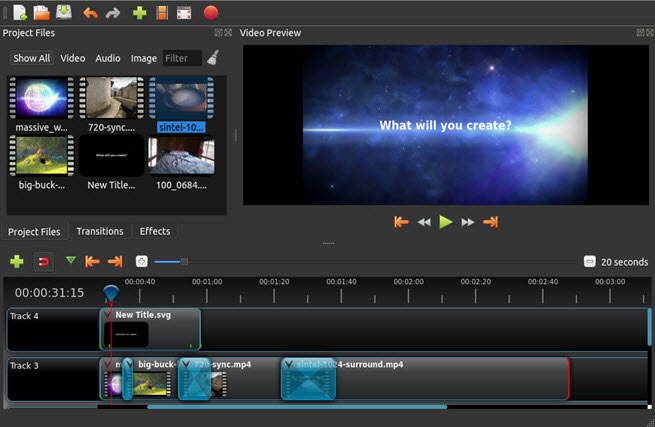
If you want to learn more about OpenShot, you can switch to this full review guide about OpenShot >>
11. Pitivi
Available on: BSD and Linux.
Official Website: https://www.pitivi.org/
What makes this built-upon GStreamer multimedia framework video editing software outstanding or quite different from others mentioned above is that there are a number of tutorials helping you learn it. Honestly, when you are new to a piece of software, the manuals are very important. In its manuals, you will also learn about all of its video editing features, obviously. It will tell you how to use it to trimming, splitting, using effects, adding transitions. Surely there would be other very basic stuffs, even like how to import your clips, how to manage them well, how to export the finished project, etc.
12. Shotcut
Available on: Windows, macOS, BSD, and Linux.
Official Website: https://shotcut.org/
If you are on the lookout for a free open source video editor which shall support both simple editing things and advanced ones, then Shotcut can serve you pretty well. The first thing which is bound to delight you about Shotcut is its smart and clutter-free user interface. You can, however, add in more buttons and configure the screen in accordance to your liking by simply clicking the buttons appearing at the top of the screen.
It supports a number of codecs as well as audio and video formats. This open source video editor features easy-to-use fader controls which can help users render a professional finish to their video files. It will become pretty easy to proceed with color grading and correction using this open source video editor. A neutral color can be picked by the eyedropper tool for white balancing. It offers various audio filters such as bass & treble, balance, compressor, band pass, delay, copy channel, expander, downmix, high pass, etc. Besides, it comes with fully customizable video and audio filters create interesting results.
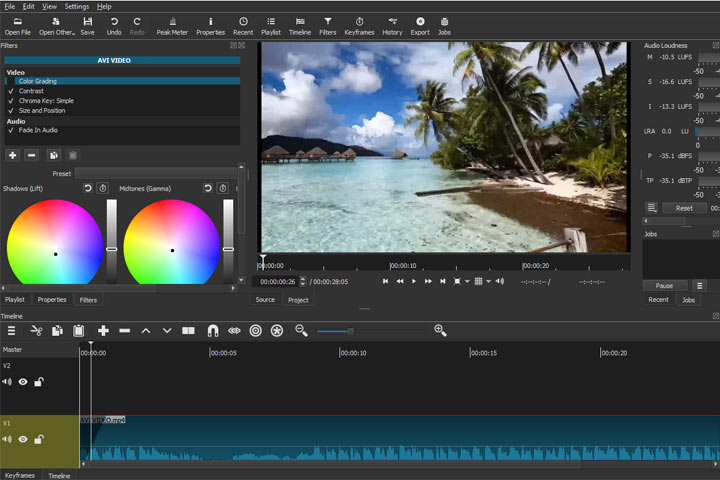
If you want to learn more about Shotcut, you can switch to this full review guide about Shotcut >>
13. VidCutter
Available on: Windows, macOS, and Linux.
Official Website: https://github.com/ozmartian/vidcutter
VidCutter is a free and open source video editing software that supports Linux, Windows and Mac operating systems. VidCutter can perform the most common video editing, such as trimming, splitting and merging. VidCutter supports popular video formats including MP4, AVI, MOV, WMV, MPEG and FLV. The software follows the GPL open source agreement. Its features are very basic, honestly.
Which One is the Best Open Source Video Editing Software?
Best overall for all systems: Openshot.
Best for Windows: Avidemux.
Best for Mac: Kdenlive.
Best for Linux: Cinelerra.
Best for special effects: NATRON.
Best for 3D animation: Blender.
The Other Open Source Video Editors Discontinued
1. Kino - was available on Linux and FreeBSD, and discontinued since 2009.
2. VirtualDub - was available on Windows, and discontinued since 2013.
3. VirtualDubMod - was available on Windows, and discontinued since 2005. But later with a version VirtualDubMod 1.6.0.0 SURROUND released by a company called Aud-X in 2006, and the Version 1.5.10.3 build 2550 released by VirtualDub-Fr.
4. VideoLan Movie Creator (VLMC) - was available on Linux, macOS, and Windows, and now is still under re-developing.

